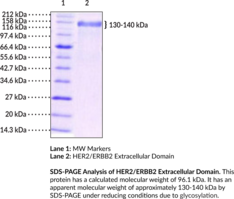Territorial Availability: Available through Bertin Technologies only in France
- Correlated keywords
- ERBB HER 2 3 4 HEK 293 IgG 1 Neu ENV ENVW ERVWE1 HERV 7q HERV7q HERV-W-ENV HERVW HERVWENV MLN 19 MLN19 NGL TKR1
- Product Overview:
Human epidermal growth factor receptor 2 (HER2), also known as ERBB2 and Neu, is a cell surface receptor and member of the EGF family of receptor tyrosine kinases that is encoded by ERBB2 in humans.{56034} It is a 185 kDa transmembrane receptor composed of an intracellular tyrosine kinase domain, a transmembrane lipophilic segment, and an extracellular domain, that is expressed at low levels in various epithelial tissues, as well as breast, lung, kidney, ovary, placenta, and the gastrointestinal tract.{56035} Unlike other EGF receptors, HER2 does not bind ligands or undergo a conformational change in its extracellular domain for activation. HER2 is activated upon heterodimerization with HER3 or HER4, which stabilizes ligand binding to HER3 and HER4, or homodimerization and enhances kinase-mediated activation of the MAPK and PI3K cellular signaling pathways.{56034,56035} Truncated forms of HER2 with constitutive oncogenic activity can be generated by proteolytic cleavage of the extracellular domain, and serum levels of the extracellular domain are increased in patients with breast, ovarian, lung, and prostate cancers.{56035} ERBB2 is overexpressed in 12 to 15% of breast cancer tumors and is associated with accelerated growth rate, increased rate of recurrence, and poor overall survival.{56035} Various mutations in ERBB2, with or without gene amplification, have been found in prostate, colon, bladder, breast, lung, and colorectal tumors, as well as metastatic cutaneous squamous small cell carcinomas.{56037,56036} Cayman’s HER2/ERBB2 Extracellular Domain (human, recombinant) protein can be used for ELISA, Western blot, and cell-based assay applications. This protein is a disulfide-linked homodimer. The reduced monomer, comprised of HER2/ERBB2 (amino acids 23-652) fused to human IgG1 Fc at its C-terminus, consists of 868 amino acids and has a calculated molecular weight of 96.1 kDa. As a result of glycosylation, the monomer migrates at approximately 130-140 kDa by SDS-PAGE under reducing conditions.
Cayman Chemical’s mission is to help make research possible by supplying scientists worldwide with the basic research tools necessary for advancing human and animal health. Our utmost commitment to healthcare researchers is to offer the highest quality products with an affordable pricing policy.
Our scientists are experts in the synthesis, purification, and characterization of biochemicals ranging from small drug-like heterocycles to complex biolipids, fatty acids, and many others. We are also highly skilled in all aspects of assay and antibody development, protein expression, crystallization, and structure determination.
Over the past thirty years, Cayman developed a deep knowledge base in lipid biochemistry, including research involving the arachidonic acid cascade, inositol phosphates, and cannabinoids. This knowledge enabled the production of reagents of exceptional quality for cancer, oxidative injury, epigenetics, neuroscience, inflammation, metabolism, and many additional lines of research.
Our organic and analytical chemists specialize in the rapid development of manufacturing processes and analytical methods to carry out clinical and commercial GMP-API production. Pre-clinical drug discovery efforts are currently underway in the areas of bone restoration and repair, muscular dystrophy, oncology, and inflammation. A separate group of Ph.D.-level scientists are dedicated to offering Hit-to-Lead Discovery and Profiling Services for epigenetic targets. Our knowledgeable chemists can be contracted to perform complete sample analysis for analytes measured by the majority of our assays. We also offer a wide range of analytical services using LC-MS/MS, HPLC, GC, and many other techniques.
Accreditations
ISO/IEC 17025:2005
ISO Guide 34:2009
Cayman is a leader in the field of emerging drugs of abuse, providing high-purity Schedule I-V Controlled Substances to federally-licensed laboratories and qualified academic research institutions for forensic analyses. We are certified by ACLASS Accreditation Services with dual accreditation to ISO/IEC 17025:2005 and ISO Guide 34:2009.





